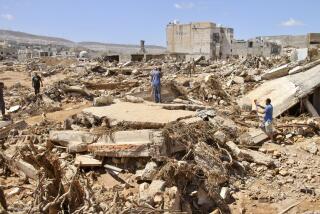Libya Agrees to Boost Payments in French Jet Crash
- Share via
TRIPOLI, Libya — A charity with ties to the Libyan government has signed a preliminary agreement to provide greater compensation to the families of 170 people killed in a 1989 explosion of a French airliner, officials here said Thursday.
The accord clears the way for a vote on formally lifting United Nations sanctions on this long-ostracized Mediterranean state as early as today, when the U.N. Security Council is scheduled to take up a British-backed resolution. The action has been delayed three times because of France’s threat to use its veto unless Libya met the financial demands of the victims’ families.
France’s objections were soothed by the reported settlement and the resolution was widely expected to pass. French Foreign Minister Dominique de Villepin told British and American officials that the settlement left his government “no further opposition to a Security Council vote on the lifting of sanctions against Libya as rapidly as possible.”
In Libya, where mercurial leader Moammar Kadafi has been striving to liberalize the economy and put his marginalized nation back into the good graces of the West, officials said they were certain that the vote would go their way.
“We’re buying peace,” Prime Minister Shukri Mohammed Ghanim said. “For us, it’s an economic venture.”
The UTA DC-10 jet carrying passengers and crew from 17 countries burst into flames over the Niger desert on its way to the Republic of Congo. Libyan officials contend that they had nothing to do with the bombing, but Kadafi’s brother-in-law and five other Libyans were convicted in absentia by a French court.
It wasn’t clear whether the French settlement forced Libya to admit guilt in the bombing, or even whether the amount of the compensation had been decided. A joint news release from the Kadafi International Foundation for Charity Assns., which is run by one of Kadafi’s sons, and the DC-10 Families in Anger, speaking for relatives of the victims, said a French foundation would be set up to “pay an amount to the victims’ families.”
The Libyans and French “have a common will to reach a final settlement within one month” that would “pave the way for a total withdrawal of any claim lawsuit against Libya or Libyan nationals,” the news release said. More details were to be released Saturday, after the expected U.N. vote.
France was incensed when Libya agreed in August to pay $2.7 billion in compensation for the 1988 deaths of 270 people in the bombing of a Pan Am jet over Lockerbie, Scotland. With the Lockerbie payment, Libya was vying for international goodwill -- but the $10-million-per-family settlement dwarfed the sum already paid to the UTA victims’ families, who collected $194,000 each.
France protested, and Libya found itself snared in a diplomatic tangle.
Tensions inched higher because the Lockerbie settlement was linked to the lifting of U.N. sanctions; the families of the Lockerbie victims can’t collect any money until the international sanctions are cleared.
“I hope the families can finally close the door on this part of it,” James P. Kreindler, a lawyer who helped negotiate the Lockerbie deal, said Thursday. “France’s position was untenable, an abuse of its role as a Security Council member. They are supposed to act to protect the security of the world, not to cover up their own embarrassment.”
The families of the UTA victims won a $34-million settlement from Libya in 1999, but the French government took $28.9 million, in part to pay legal fees and compensate Air France, UTA’s parent company.
For Libya, the meaning of a U.N. vote was more psychological than practical. The international sanctions have been suspended since 1999, when Libya turned over two suspects in the Lockerbie bombing for trial.
The clearing of U.N. sanctions may improve Libya’s image and boost its morale. But Libya has lost as much as $30 billion to travel and trade restrictions, and unemployment and infrastructure woes linger. Moreover, Kadafi’s controversial three-decade swing from socialism to “freedom fighting” to Western-friendly capitalism has still left him far from his goal of international acceptance.
The U.S. retains its sanctions on Libya, barring American oil companies from capitalizing on the concessions they hold here. Libyan officials are hopeful that a U.N. vote to lift international sanctions will eventually lead to the easing of U.S. measures.
But American officials have said their restrictions aren’t likely to be lifted unless Libya addresses other concerns, such as improving its human rights record and allaying fears that it might have ambitions to develop weapons of mass destruction. The U.S. was expected to abstain from the vote.
Still, diplomats and officials who made their way to a musty conference room in a seaside hotel for a quick and chaotic news conference hailed the agreement as an important step for this troubled state.
“This is very important for them,” said a diplomat based in Tripoli, the Libyan capital. “I mean, look, this will never be an oasis of democracy. But we see that things are changing.”
Stack reported from Tripoli and Farley from the United Nations.
More to Read
Sign up for Essential California
The most important California stories and recommendations in your inbox every morning.
You may occasionally receive promotional content from the Los Angeles Times.










